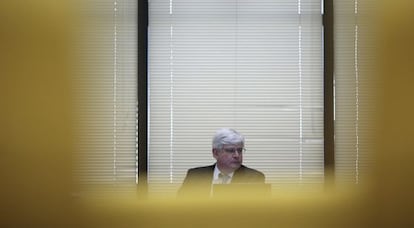Dozens of Brazilian lawmakers could be targeted in Petrobras graft case
Attorney general asks Supreme Court to investigate 54 people, including ruling PT members


Brazil’s attorney general on Tuesday asked the Supreme Court to investigate a group of lawmakers, many from the ruling Workers Party (PT), who allegedly collected payoffs as part of a widespread bribes-for-contracts scheme at state-run oil company Petrobras.
The names of the 54 people, including many elected officials, will be released in the coming days and could cause a major political crisis for President Dilma Rousseff, who is just beginning her second term in office, political observers said.
“Those who have to pay, will pay,” Attorney General Rodrigo Janot told a group of supporters recently. Some Brazilians have hailed Janot as a national hero since he took on the case.
Although the names have not been released yet, the Brazilian press reported that at least 40 lawmakers – the majority of them from Rousseff’s PT grouping and other parties that support her in Congress – will be the targets of investigation.
Among those reported to be on the list are Chamber of Deputies speaker Eduardo Cunha and Senate president Renan Calheiros. The name of PT treasurer João Vaccari, who is accused of diverting Petrobras funds to finance election campaigns, is also likely to appear.
Former top officials at the Brazilian oil company are also said to be cooperating with the investigation. Through plea bargains for lower prison sentences, ex-oil officials and businessmen have reportedly provided authorities with the list of names of politicians who were allegedly bribed.
Brazil’s political sector is bracing for the worst. Some expect that pacts between parties in Congress will be broken.
“It is obvious that there is going to be some turbulence, and it is going to happen right at the time when the country needs some peace,” said Defense Minister Jacques Wagner, a former governor of Bahía state who is close to Rousseff.
Moody’s downgraded all Petrobras ratings, including the firm’s unsecured debt, to Baa2 from Baa3
The political crisis comes on the heels of an economic downturn. Brazil has once again entered into recession and the country’s unemployment rate has grown to 5.3 percent in January from 4.8 percent during the same month last year.
Last week, Moody’s downgraded all ratings for Petrobras, including the company’s unsecured debt, to Baa2 from Baa3. The ratings firm said the action reflects the “increasing concern about corruption investigations and liquidity pressures.”
Investors are not only concerned about the Petrobras case – they are also worried about the cuts in public spending announced by Economy Minister Joaquim Levy.
Last week, Levy abolished a major tax exemption for companies that Rousseff introduced in 2011, and ordered drastic cuts at government agencies.
At the same time, the government announced that it would raise electricity rates, which could see bills go up by 30 percent for some middle-class families, above all in São Paulo.
Levy, who is known as an expert in making adjustments, has said he intends to save the country around $24.7 billion and promises to balance the budget.
Tu suscripción se está usando en otro dispositivo
¿Quieres añadir otro usuario a tu suscripción?
Si continúas leyendo en este dispositivo, no se podrá leer en el otro.
FlechaTu suscripción se está usando en otro dispositivo y solo puedes acceder a EL PAÍS desde un dispositivo a la vez.
Si quieres compartir tu cuenta, cambia tu suscripción a la modalidad Premium, así podrás añadir otro usuario. Cada uno accederá con su propia cuenta de email, lo que os permitirá personalizar vuestra experiencia en EL PAÍS.
En el caso de no saber quién está usando tu cuenta, te recomendamos cambiar tu contraseña aquí.
Si decides continuar compartiendo tu cuenta, este mensaje se mostrará en tu dispositivo y en el de la otra persona que está usando tu cuenta de forma indefinida, afectando a tu experiencia de lectura. Puedes consultar aquí los términos y condiciones de la suscripción digital.








































